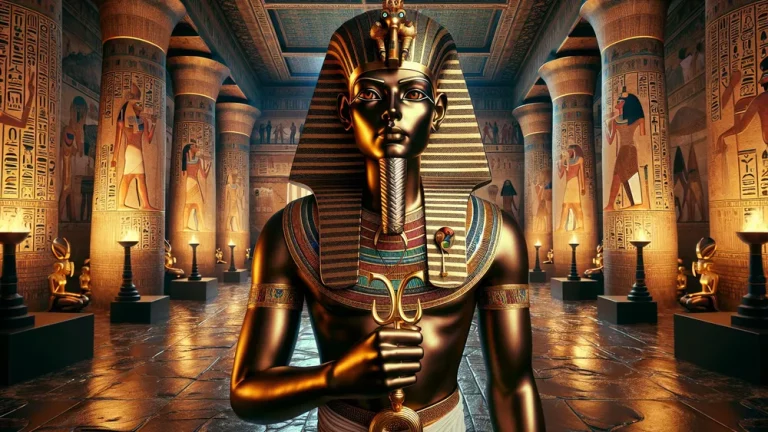Tantalus: The Greek Mythology King Punished By The Gods
In the mix of Greek mythology, few stories are as noteworthy and cautionary as the story of Tantalus. Consider a king once liked by the gods, invited to their divine meals, and aware of their secrets. This is about Tantalus, a man whose actions led to one of the most famous punishments in myth history.
Key Points:
- Tantalus was a king in Greek myths.
- He was the son of Zeus and the nymph Pluto.
- Tantalus committed a crime by serving his son Pelops as food to the gods.
- His punishment was eternal suffering in Tartarus.
- He stood in water and under a fruit tree, always thirsty and hungry.
- Tantalus represents the dangers of too much pride.
- His story influenced Greek culture and teachings about humility.
When we dig into his story, you’ll see how his family background, his serious crime, and the tough consequences he went through mean a powerful story about pride and gods’ punishment. Whether you’re new to Greek myths or want to increase your knowledge, this look at Tantalus will give a full look at his life, his fall, and his lasting effect on old Greek culture and religion.
Tantalus: Overview and Key Facts
| Key Fact | Description |
|---|---|
| Name | Tantalus |
| Role | A king in Greek myths |
| Family Background | Son of Zeus (or Tmolus) and the nymph Pluto |
| Kingdom | Ruled the area of Sipylus in Lydia (modern-day Turkey) |
| Gods’ Preference | Liked by gods at first; when he joined their divine meals on Mount Olympus |
| Serious Crime | Made his son Pelops into a meal for the gods, among other wrongdoings |
| Big Punishments | Timeless suffering in Tartarus; stands in water beneath a fruit tree, unable to drink or eat |
| Symbolism | Means pride and the big punishments when offending gods |
| Effects on Culture | Affected Greek religious practices, books, and art |
| Descendants | Pelops, Niobe, and Broteas, who have important myths connected to them |
The Tale of Tantalus
To really get the importance of Tantalus’ story, we need to dig into the details of his background, his wrongdoings, and the heavy punishment that followed. Let’s look at the different parts of his myth. We’ll start with his family background and his initial favor with the gods.
Where Tantalus Came From
Tantalus was a critical person in Greek myths, known for his royal family background and role as a king. He was the son of Zeus, chief of the gods, and the nymph Pluto. This made him a demi-god with a godly background. Some say Tmolus was his father, but most agree Zeus was his dad.
Tantalus ruled over the area of Sipylus in Lydia, now in Turkey. His kingdom did well, and he was strong and influential. Think of a leader today who is not just powerful but also directly linked to the most important people; this was Tantalus in ancient Greek society.

His connection to the gods at first was very good. He was invited to eat with them on Mount Olympus, an honor given to very few humans. It’s like being invited to a top event where only the best guests go. The gods trusted him and told him their secrets. This showed they valued him a lot. This early favor and close connection set the stage for his big fall, as his actions would later betray this trust greatly. Here are some key points about his early life and favor with the gods:
- Godly Background: Son of Zeus and the nymph Pluto.
- Kingdom: Ruled over Sipylus in Lydia.
- Gods’ Favor: Invited to eat with the gods on Mount Olympus.
- Trust: Aware of the gods’ secrets, meaning they held him in high regard.
Tantalus, a demi-god and king of Sipylus, was initially favored by the gods, even dining with them on Mount Olympus, which later made his betrayal of their trust more significant.
What Tantalus Did Wrong
Tantalus committed a terrible crime in Greek myths, something that shocked the gods. He wanted to test if the gods were all-knowing. So, he invited them to a meal and served his own son’s flesh, Pelops. This act of killing his son and making a meal was not just a serious wrongdoing. It directly insulted the gods, who cared about family and the natural order.

Think about a trusted friend inviting you over and serving something sacred to you; this is the level of betrayal Tantalus showed.
The importance of Tantalus’ actions in Greek myths is very high. His crime showed too much pride since he believed he could trick the gods and challenge their wisdom. It disrupted the divine order and broke the bond between people and gods. The gods were horrified and angry when they realized what the meal was. They brought Pelops back to life and gave Tantalus an endless punishment in Tartarus. Here are key points of his crime and the direct fallout:
- Crime: Served his son Pelops as a meal to the gods.
- Importance: Showed too much pride and broke the divine order.
- Immediate Results: Gods brought Pelops back and punished Tantalus forever.
How Tantalus Was Punished
The gods sent Tantalus to never-ending suffering in Tartarus, a deep abyss used as a place of pain in Greek myths. His punishment was strange and painful: he stood in a pool of water under a fruit tree with low branches. He bent down to drink the water, but it moved away, so he was always thirsty.

When he reached for the fruit, the branches moved just out of reach, so he was always hungry. Think about trying to grab your favorite foods and drinks, but they keep moving away; this was his never-ending desire and denial, showing how serious his actions were and how he betrayed the gods.
Tantalus’ punishment means a lot with moral lessons. His never-ending pain is a strong reminder of the results of too much pride and the big results of offending the gods. This suffering is a direct match to his crime: just as he took away his son Pelops’ life, he is now denied basic needs like food and water. This endless state of wanting but never getting also means trying to trick or outsmart the gods is useless. The myth of Tantalus teaches the importance of being humble and the dangers of having too much pride. Here is a table with the main points of his suffering:
| Aspect of Punishment | Description |
|---|---|
| Location | Tartarus, a deep place of pain |
| Water | Moves away whenever Tantalus tries to drink, so he is always thirsty |
| Fruit | Branches rise whenever he tries to eat, so he is always hungry |
| Meaning | Means the results of too much pride and breaking the trust with gods |
| Moral Lesson | Teaches the importance of being humble and the risks of too much pride |
What Tantalus Stands For
To really understand the lasting effect of Tantalus’ story, we should look into the deeper ideas and lessons his myth means. Let’s look at how his story means too much pride and its effect on Greek religion.
Tantalus and His Big Ego
Tantalus’ story is a classic example of a big ego, which means too much pride or self-confidence that leads to a downfall. In Greek myths, a big ego was a serious fault because it means a person tries to elevate themselves to the level of the gods. Tantalus, with his arrogance, thought he could trick the gods by giving them the flesh of his son, Pelops.
This act was not just a crime; it was a direct challenge to the gods’ all-knowing power. Think about someone who thinks they are above the law and breaks it, believing they won’t be caught, only to be severely punished. This is the core of Tantalus’ big ego: his belief that he could outsmart the divine.

The moral and ethical lessons from Tantalus’ myth are important and last a long time. His story means a warning about the dangers of too much pride and the need for humility. The Greeks believed that a big ego would inevitably lead to payback from the gods. Tantalus’ endless suffering in Tartarus is a clear reminder that no one, not even a king with divine lineage, is above moral laws. The myth tells us that actions have results and that trying to change the natural order leads to suffering. Here are some key moral and ethical lessons from Tantalus’ story:
- Humility: Knowing one’s limits and respecting the divine order.
- Results of a Big Ego: Too much pride leads to severe punishment and suffering.
- Respect for the Divine: The authority and wisdom of the gods should not be challenged.
- Moral Accountability: Actions, especially those that harm others, bring consequences.
How Tantalus Affected Greek Religion
The myth of Tantalus had a big impact on Greek religious ways and beliefs. It was a strong reminder about the results of big ego and why respecting the divine order is important. In old Greece, myths were more than just stories. They were key parts of social and religious life. These stories shaped how people did rituals and what morals they followed.
Tantalus’ tale, with its themes of divine payback and moral accountability, reinforced the belief that the gods were all-knowing and all-powerful. Mortals must act with humility and respect. While there were no specific rituals tied directly to Tantalus, his story would have been told during festivals and ceremonies as a warning. Think about how historical events or modern parables are used in teachings today.
Similarly, Tantalus’ myth served to teach and remind the Greeks about the values and principles their gods upheld.
What Tantalus Left Behind
Now that we’ve looked into the importance of Tantalus’ myth, let’s see how his story was kept and shown in old Greek literature and art.
Tantalus in Old Greek Stories
Tantalus is an important character in old Greek stories, with his story told by several famous authors, including Homer and Pindar. In Homer’s “Odyssey,” Tantalus appears in the Underworld, suffering his never-ending punishment of being tempted by food and water just out of reach.
This clear picture means we see how serious his crime was and how the gods paid him back. Pindar, in his songs, also talks about Tantalus, showing the moral lessons of his story. Pindar’s works often focus on themes of divine justice and the consequences of big ego, using Tantalus as a warning. The story of Tantalus is different in various texts.

This reflects how Greek myths were told and retold by different authors over time. For example, while Homer focuses on the punishment and moral results, other sources might talk about different parts of Tantalus’ life, like his family or his talks with the gods. Some versions even look into the fate of his kids, like Pelops, who is important in other myths.
This variety in storytelling is like how modern versions of old stories highlight different themes or characters, giving us a richer view of the myth. By looking at these different versions, we understand more about the cultural and moral values of old Greece and how these were shared through myths.
Tantalus, a key figure in Greek myths, illustrates the themes of divine justice and the consequences of pride through various interpretations by authors like Homer and Pindar, reflecting the rich storytelling traditions of ancient Greece.
Tantalus in Greek Art and Culture
The myth of Tantalus has been clearly shown in old Greek art and culture, acting as a strong visual cue for his story and its moral points. From the classical period, pottery often shows scenes of Tantalus’ punishment, with intricate designs seeing him trying to reach food and water that always escape him. These images were familiar to many Greeks. Much like instantly recognizable scenes today.
Sculptures and reliefs also catch the essence of Tantalus’ distress, emphasizing the physical and emotional pain of his endless punishment. For example, a well-known relief from the Temple of Zeus at Olympia means Tantalus in a moment of sadness, surrounded by the gods who blame him.
These artistic ways not only mean the myth but also press its themes of divine payback and the results of big ego, making the story clear and easy to remember for the Greek people.
Pantheon of Greek Mythological Heroes and Figures
There are many different heroes and figures in Greek myths, including a wide range of characters, each with their own stories and qualities. From Hercules, who was very strong, to Odysseus, who was very smart, these characters and people have played important roles in shaping Greek mythology and culture.
If you want to see the full list of all Greek Mythological Heroes and Figures, you can find a detailed list of all the Greek Mythological Heroes and Figures here. This big collection gives details about the lives and stories of these interesting characters, giving us a better view of how important they were to ancient Greek people.
FAQs
1. What was Tantalus’ crime against the gods?
Tantalus’ crime against the gods was serving them a feast that included the flesh of his own son, Pelops.
2. How was Tantalus punished by the gods?
How Tantalus was punished by the gods involved being eternally tormented in Tartarus, where he stood in a pool of water beneath a fruit tree with low branches, but could never drink or eat.
3. Who are the descendants of Tantalus?
The descendants of Tantalus include notable figures such as Pelops, Niobe, and Broteas.
4. What lessons can be learned from the myth of Tantalus?
The lessons that can be learned from the myth of Tantalus include the dangers of hubris and the severe consequences of offending the gods.







